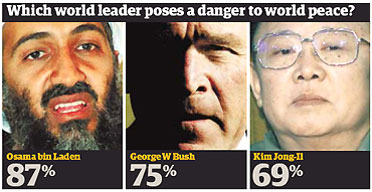The attempts of our government to overthrow Hugo Chavez of Venezuela are one of the things that really ticks me off. And the corporate press are going along - in a big way. This article, from Fairness and Accuracy in Reporting, lays it all out.
The Op-Ed Assassination of Hugo Chávez
Commentary on Venezuela parrots U.S. propaganda themes
By Justin Delacour
President Hugo Chávez Frias (700 Club, 8/22/05), the editors of several major newspapers were quick to denounce his outrageous incitement to violence. However, in criticizing the conservative televangelist, the prestige press overlooked its own highly antagonistic treatment of Venezuela’s president, which surely contributed to the heated political climate in which Robertson made his threat.
Even so-called “moderate” columnists have contributed to the deterioration of U.S.-Venezuela relations by distorting the Venezuelan government’s domestic and foreign policy record. Robertson may indeed be “just a garden-variety crackpot with friends in high places,” as the New York Times opined (8/25/05), but the televangelist’s erroneous characterization of Venezuela’s president as a “strong-arm dictator” is hardly distinguishable from, say, Thomas Friedman’s contention that Chávez is an “autocrat” (New York Times, 3/27/05).
In studying the opinion pages of the top 25 circulation newspapers in the United States during the first six months of 2005, Extra! found that 95 percent of the nearly 100 press commentaries that examined Venezuelan politics expressed clear hostility to the country’s democratically elected president...
Of course, Chavez is not only calling Bush the devil, he's also challanging neo-liberal economics. This means he's threatening the bloody pyramid of wealth that the US sits atop - which makes him more than just Bush's enemy.
The U.S. media’s distorted characterizations of Venezuela’s government were typified by Diehl (Washington Post, 1/17/05), who claimed that Chávez is “aggressively moving to eliminate the independence of the media and judiciary, criminalize opposition and establish state control over the economy.”
The Post more explicitly conflated democracy with U.S.-sponsored “free market” policies in a January 14 editorial, in which it asserted that Chávez’s “assault on private property is merely the latest step in what has been a rapidly escalating ‘revolution’ . . . that is undermining the foundations of democracy and free enterprise.”
The notion that U.S.-sponsored neo-liberalism (“free enterprise”) is the only economic model compatible with democracy was further promoted by the Miami Herald (5/8/05), which declared that “the pugnacious Mr. Chávez is determined to push his populist model to the people of the region as a competitor to real democracies...”
And as is common, Chavez is accused of committing the sins of the US.
Aside from neglecting to provide proof for the charge that Chávez destabilizes Latin America, columnists failed to recognize the hypocrisy of accusing Venezuela of meddling in a region where U.S. interference is second to none. In reality, it is the Bush administration—not the Chávez government—that is known to meddle in the internal affairs of Latin American countries. During recent presidential races in Nicaragua (2001), Bolivia (2002) and El Salvador (2004), Bush administration officials openly threatened to penalize the three countries if their citizens elected candidates who opposed U.S. policies.
Good article. I recommend it.
